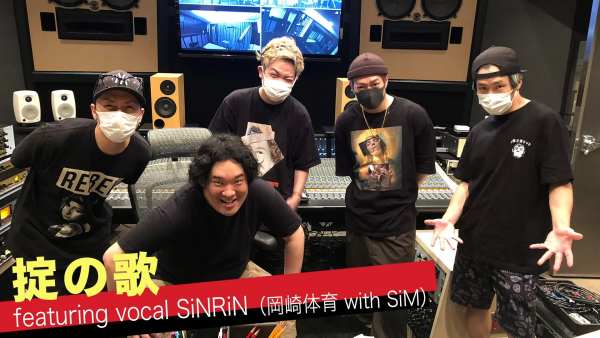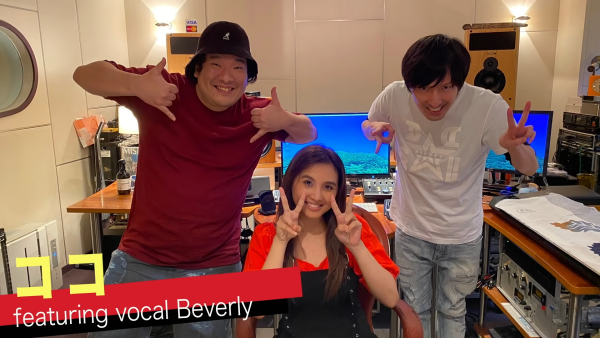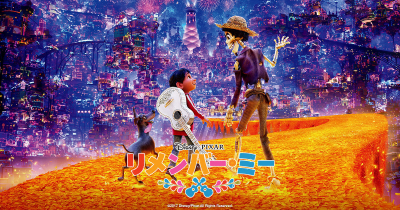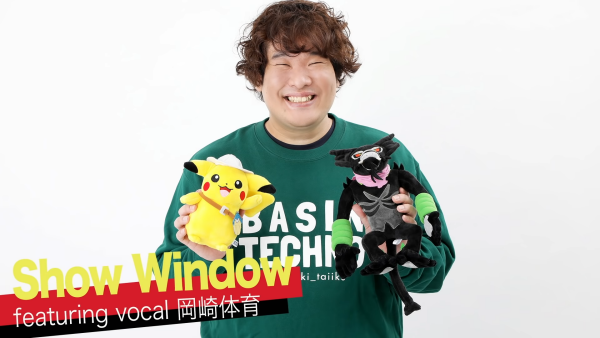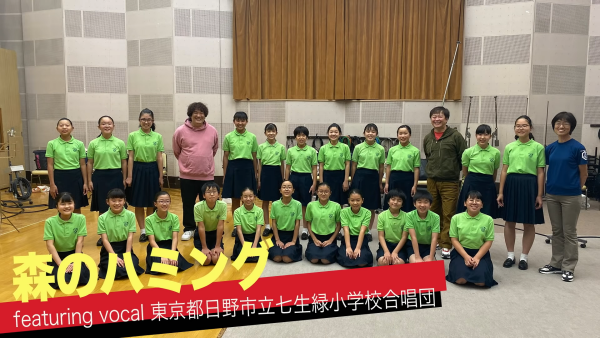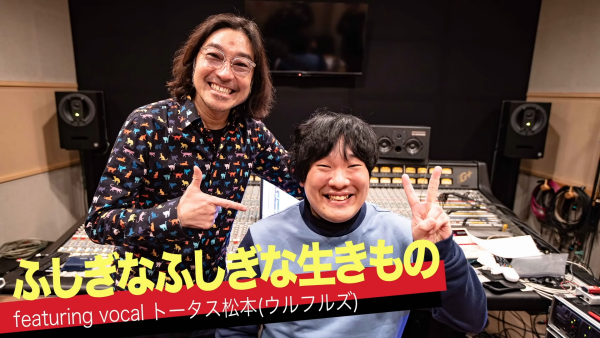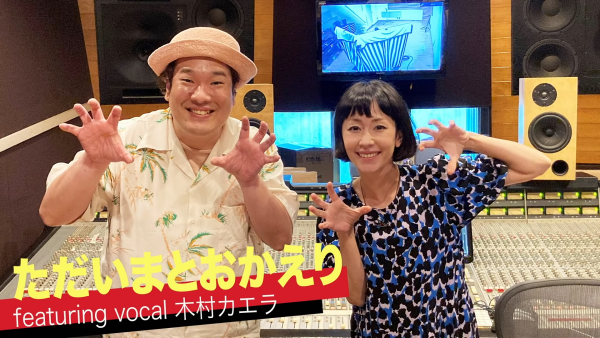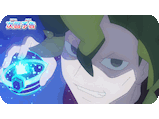
Film 23


Main
Old Updates Archive
Links
 |
Lists |
List of Pokémon
Pokémon World Atlas
List of Techniques
List
of Items
List of TV Episodes
 |
Guides |
Episode
Comparisons
Movies
& Specials Guide
CD Guide
DVD Guide
Voice
Actors Guide
Lyrics Archive
Manga Guide
Video Games
 |
Miscellaneous |
Humor
Pokémon Bashing
Features
Rants
Japanese Movie #23: "Pocket Monsters The Movie "Koko""
English Movie #22: ”Pokémon: Secrets of the Jungle"
Japanese Release Date: December 25th, 2020
American Release Date: October 8th, 2021
Important Characters: Koko (Koko), Dr Zed (Dr Zed), Karen (Sharon), Dr Chrom Molybdenum (Dr Chrom Molybdenum), Dr Lin Molybdenum (Dr Phossa Molybdenum)
Important Places: Okoya Forest (Forest of Okoya), Milyfa Town (Milyfa Town)
One day a Zarude finds a human baby in the forest and decides to raise it as his own. Years later, Satoshi and Pikachu meet a group of researchers for the Biotope Company, an organization studying the water in that same forest for its alleged healing properties. He also has a chance encounter with Koko, the boy the Zarude had taken in as his son. Satoshi quickly becomes friends with Koko and shows him around a nearby town, introducing him to humans and their culture. Could Koko actually be one of these "humans" after all!? After a heated argument with his Dada, Koko works out that his human parents were researchers at the Biotope Company studying the Holy Tree, the mystical entity thought to be the source of the forest's healing waters. The project's other lead researcher, Dr. Zed, is after the Holy Tree himself and so he tricks Koko into leading him to its location. Dr. Zed then starts to tear the forest apart to get his hands on the Holy Tree and so Satoshi, Koko, and all the Pokémon of the forest combine their powers to fight him off and protect the forest. After Dr. Zed is defeated, the humans and Zarude start the work to repair the damage done by the overzealous doctor. Some time later, Koko comes to realize that he's both a human and a Pokémon and decides to set off on a journey to find a way to bring the two worlds closer together.
Thoughts
I touched upon this in my comparison for the previous movie, but the fact that I write full reviews of the films as they come out now makes a review in the "Thoughts" section here a bit redundant. I recently re-read the review I wrote when the movie first came out and my opinions on it haven't really changed all that much and so I think I'll skip my usual thoughts on the original and go straight into talking about the English dub.
TPCi's version of Pocket Monsters The Movie "Koko," which they've renamed Pokémon The Movie: Secrets of the Jungle, is an all-around fantastic dub. I'm actually going to spend a lot of this comparison heaping praise on the amazing job that everyone did on this, believe it or not. There is one huge, glaring issue with TPCi's version of the film that I have to bring attention to, unfortunately, but on the whole I'd say this movie was an even better dub than their version of Mewtwo Strikes Back Evolution was.
Voice-acting wise, this is a pretty solid dub by a pretty solid cast. Edward Bosco and Kimlinh Tran give strong performances as "Dada" Zarude and Koko respectively, but it's Billy Kametz as Dr. Zed who really steals the show for me. Dr. Zed is the kind of character you could easily mess up if you play him too much like a one dimensional cartoon villain but Billy Kametz avoids that and treats him like the complicated, multi-layered person that he is. I...I think I like it just as much as Kou'ichi Yamadera in the original...? As for the regulars...Sarah Natochenny as Ash is a strange one to me because I generally don't like the work she does on the TV series at all yet when it comes to the movies I find her acting to be surprisingly decent. I don't know if she's just trying harder because it's a movie or what it is but there's a definite improvement here. The only real duds to me voice-acting wise are the Rocket trio, but they will always be the dub's weakest link as long as those actors continue to cling onto those roles.
As good as the voice acting is I would say the writing is the bigger improvement between the dub of this film and the dub of Mewtwo Strikes Back Evolution. While the latter was brought down by its awkward devotion to the old 4Kids rewrites this film, thankfully, isn't haunted by the ghosts of a dub that came out two decades ago. The result is a very faithful and well written adaptation from start to finish. Netflix didn't include a Japanese audio option this time around but if they had bothered to do that one very simple thing they could have just used a transcription of the dub script as their subtitles and I would've been perfectly fine with that. The script is that good.
The dub gets so many things right...but then they had to go and replace the vocal songs.
A lot of people kind of dismiss changes like those as being "not that big a deal" or "easy to ignore," but I just don't feel the same way. I get that movies having theme songs in them is a bit of a dying art and that (American) audiences don't seem to care about them much anymore. But after listening to Pocket Monsters The Movie "Koko" Supporters' Podcast - "The Movie Secrets We Want to Tell You," in which the people who worked on the movie talk about the filmmaking process, it's clear to me that the staff of this film care very much. Koko, Show Window, Fushigi na Fushigi na Ikimono, and Tadaima to Okaeri aren't just some filler songs that were thoughtlessly thrown into the background to fill up space; they were hand picked by the film's director himself to enhance the messages he was trying to tell with his film. To take those away and callously replace them with songs that I would bet money Mr. Yajima had nothing to do with creates a movie whose message is not as strong.
It's the year 2021; replacing vocal songs should not still be a thing.
The Shiny Celebi
keeps its Japanese voice.
Video Edit
(Added "Footage" -- 3 seconds)
The opening Pikachu logo is a little
different depending on what
version you're watching.
If you're watching in
Japanese, you can hear the sound of the drums that start off the The Song of Rules as soon as
Pikachu
appears on the screen. After that, there's a cut to black that lasts
two seconds before we transition to the first establishing shot of the
Okoya
Forest.
If you're watching in
English, however, we don't hear any drums while Pikachu is on-screen at
all.
The shot cuts to black, just like it does in the Japanese version, and then the drums
start playing. The black screen also lasts five seconds, not two,
presumably to allow the audio to sync back up with the video again.
It's a really odd
change. A
wholly insignificant change, sure, but an odd change nonetheless.
Music
"Edit"
Speaking of songs, The Song of Rules
actually gets a dub! As in, TPCi does what literally every anime
adaptation company's been doing for the last decade and a half or so
and translates a Japanese song into English!
And the results are
actually pretty great! Here are side-by-side comparisons of the lyrics
of both versions:
| Japanese
(original) |
Japanese
(translated) |
English
Dub |
| さ
あうたえ!ザルード! |
OK,
let's sing out! Za-ru-de! |
Sing
now, Zarude |
| 誰
よりも強く |
We're
stronger than anybody, |
We
are the strongest |
| 恐
れはしない |
And
we have nothing to fear |
We
have no fear |
| わ
れら森の血 |
We are the blood of the forest | We
are the voice of the jungle |
| 声
をあげろ! |
Lift up your voices! | Lift
up your voices |
| わ
れら森の血 |
We are the blood of the forest | We are the voice of the jungle |
| 声
をあげろ! |
Lift up your voices! | Lift up your voices |
| 土
に染み込む水 |
The
water soaked up by the earth |
The
ground catches the water |
| 木
は育ち |
Makes
the trees grow. |
The
water nurtures the trees |
| 陽
に照らされ |
They're
bathed in sunlight |
The
sun shines down the forest |
| 森
となる |
And
become the forest. |
The
trees become the jungle |
| き
こえるか |
Can
you hear them? |
Woo,
can you hear it? |
| 多
くの足音が |
All
those footsteps. |
Footsteps
upon footsteps |
| き
こえるか |
Can
you hear them? |
Woo,
can you hear it? |
| 多
くの声が |
All
those voices. |
Voices
upon voices |
| わ
れら森の血 |
We are the blood of the forest | We are the voice of the jungle |
| 声
をあげろ! |
Lift up your voices! | Lift up your voices |
| わ
れら森の血 |
We are the blood of the forest | We are the voice of the jungle |
| 声
をあげろ! |
Lift up your voices! | Lift up your voices |
| 神
木と共に |
Together
with the Holy Tree! |
Under
the Heart Tree |
That's remarkably close, right!? The only note I would have is that the English dub version doesn't mention anything about "the blood of the forest" while the Japanese version does, which at first I thought this was maybe some kind of self-censorship thing? But then the movie uses the term "lifeblood" a bunch of times throughout the third act so that can't be it. Maybe "blood" is OK to say in dialogue but not OK to put in a song lyric? *shrugs*
The rest of the song
is really fantastic though -- great translation, great rhythm, great
vocal performances, great everything! More of this, please!
Dialogue
Edit
I mentioned this in the "Thoughts" section already, but the script for
the English dub of this movie is very nearly perfect.
There are still a few changes here and there worth talking about,
however, so
let's dig right in.
The shinboku (神木), or "Holy Tree," gets
called the "Heart Tree" in the English dub. The Japanese term comes
from shin, one of the
readings of the character for "god" or "holy" (神), and
boku, one of the readings of the character for "tree" (木),
so you put those two together and you get "Holy Tree."
TPCi's rename is most likely to avoid having anyone in the dub say the
word "holy."
Now let's talk
pronunciation for a bit. In the Japanese original the name "Zarude" (ザルード) is pronounced with an
equal emphasis on all its syllables but the English
dub decides to go all in on that second syllable there for some reason
to make "Za-ROOd." And honestly? I couldn't not hear Stephanie Tanner
throughout the movie.
Similarly, Okoya Forest gets pronounced O-koy-ya, with an emphasis on the middle. They also make that middle syllable rhyme with the word "boy." It should be Oh-koh-yah, with an equal emphasis on all the syllables and the second "o" and the "y" being two distinct syllables completely disconnected from one another. The name Okoya, by the way, was taken by rearranging the letters in oyako (親子), the term used throughout this movie that literally means "parent and child" but can also mean, in the context of this movie, "father and son." I'm kind of surprised TPCi didn't rename it to duplicate the same play on words in the English version (Fasonther Forest, maybe?) but I'm also not complaining about more names being the same across all versions!
Music
Edit
Something I will
complain about, very much, is the movie's habit of changing its insert
songs.
Despite the fact that
The Song of Rules got a
very good dub that played just a few minutes ago, the movie's opening
theme Koko (ココ) by Beverly gets replaced
by a brand new song called Always
Safe
by Cyn.
The trilingual singer
of the Japanese theme song actually released an English cover of her
song Koko about half a year
before Pokémon The Movie:
Secrets of the Jungle came out on Netflix:
| BeverlyEnglish |
You can
find the lyrics to this English language cover here.
If this was
literally any other franchise then the people in charge of dubbing this
movie would've been like
hey, let's just use this version of the song and call it a day. Why do extra
work when there's a perfectly usable song right the eff there? Make
some phone calls, sign a few contracts, and get this ish done.
But that's not at all what happened, is it?
Why not?
Well, there's a lot we don't know about the situation. We don't know whether or not TPCi even tried to contact Beverly and/or her
record label to arrange to have her version of the song used, and we
don't know how much her record label Avex Trax would've charged for it
to be used for all the international dubs out there. We also don't know
what kinds of arrangements TPCi made with Cyn and her record label
(though I do have some theories that I'll get into at the end of the
comparison).
But, I'm pretty sure money wasn't a factor at all because TPCi
apparently has the money lying around to make this nonsense:
| BidoofSong |
What you're looking at is an actual, honest-to-God music video that TPCi produced for "Bidoof Day," a made up holiday that they only just started celebrated the year this movie came out. If you watch this video in a vacuum then it's a perfectly amusing way to spend nearly two minutes. I got a chuckle out of it even! But the longer I watch it the more I think about the ungodly amount of time and money TPCi must've spent making this. Negotiating with Rick Astley and his record label to get the rights to use Never Gonna Give You Up, hiring songwriters to make up brand new lyrics, booking the talent and studio space needed to actually record the song, getting custom made CG animation made, hiring editors to compile all the footage and put it together, making sure everything is running on schedule to make the video's release deadline...it's a lot!
So the way I see it, if TPCi can spend God only knows how much time and money to make an amusing (but also completely pointless) little meme video, or to book acts like Katy Perry or Post Malone for their little 25th anniversary celebration, then they sure as hell should be able to afford the rights to use an English language song for their yearly movie release.
Side
Note
After the movie's opening theme we get a new title screen:
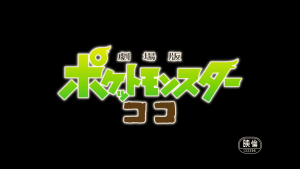 |
 |
So while we're here I wanted to talk about the title of this movie, Koko. In the first episode of Pocket Monsters The Movie "Koko" Supporters' Podcast - "The Movie Secrets We Want to Tell You," director Tetsuo Yajima explains why he named the movie what he did:
| It's now time to talk about the main
event; Pocket Monsters The Movie "Koko." (Podcast host) Mr. Yoshida
comments on how
short the title of the movie is this time around, with (voice actor
Shoko) Nakagawa
chiming in to say that she's used to the movie titles being filled with
a bunch of Pokémon names, like Dialga
vs. Palkia vs. Darkrai, or
titles with unique kanji characters in them, like Revelation Lugia. But
starting from "I Choose You!" and "Everyone's Story" the titles have
been getting more and more simple, right? So why just "Koko"? (Film
director Tetsuo)
Yajima says they thought up of a bunch of other titles for this movie,
similar to the older movie titles, but they ended up settling on "Koko"
because they thought having such a short and succinct title would
actually make the movie stand out more. |
TPCi has kept movie titles as-is before ("I Choose You!" and "Mewtwo Strikes Back Evolution") but opted to change the title to this film to Secrets of the Jungle. Most people assume the change was made because the title "Koko" sounds too similar to Pixar's 2017 film Coco and that TPCi, afraid of getting sued to death, opted to play things on the safe side and came up with a completely different title instead.
It's worth noting that the Koko / Coco similarities was never really a thing in the movie's home country because Coco wasn't released over in Japan as Coco; it came out under the title Remember Me (リメンバー・ミー). Pixar films get name changes in Japan all the time (The Incredibles became Mr. Incredible, Up became Old Man Carl's Flying House, Inside Out became Inside Head, etc) and so this was just following that trend. Western fans made the connection between "Koko" and "Coco" almost immediately but I would say that most Japanese fans probably didn't.
Interestingly, most of the countries that don't use the English dub as their base and instead dub directly from the Japanese version (so most of Asia, basically) opted to call the film some variation of Pokémon: Pikachu's and Koko's Adventure instead. So there's that.
Dialogue Edit
All the men in this movie (Koko / Al,
Dr Zed, Chrom Molybdenum) get to keep their Japanese names but the
women do not. Karen (カレン)
becomes Sharon, most
probably because the word "Karen" has become a
bit of a thing lately,
though I wonder how many non-Americans would even get the reference...?
Calling someone a "Karen" is most definitely not a thing in Japan, I
can tell you that much! Dr. Lin Molybdenum gets her name localized
to Phossa Molybdenum, though I guess that makes sense; rin (燐) is
just the Japanese word for "phosphorus," after all.
Skwovet's vocal
performance is a big distraction to me, but it's not really the
dubbers' fault. It's just that the Pokémon has an improbably
difficult name in the context of creatures saying their names in this
franchise. I go a bit into this
phenomenon with Jigglypuff in my comparison for "The Song of Jigglypuff" so I'll just
copy/paste that here:
| So
let's look at Purin. In Japanese, its ability to say "pu" or "ri" or
"puri" is a completely believable set of sounds for a magical cartoon
balloon monster to be able to make, right? They're easy, almost
baby-ish noises. But now let's look at the English version.
"Jigglypuff," as fine as a name as that is, has a lot of unique vowel
and consonant combinations and it's difficult to imagine any wild
creature being able to perform the lingual gymnastics required to say
the name. We can accept that this little pink ball can make "ggl" sound
but can't say something simple like "hello"? It can't sing real words?
Really?! |
The same things applies to Skwovet here. "Ho," "shi," "ga," "ri," "su" are fairly simple sounds, linguistically speaking, but "Skwo?" That's (literally) a mouthful! It's also really hard to make an ugly sounding name like "Skwovet" sound cute, and while the voice actor tries their best with what they've got it still doesn't quite sit right on the ear.
Ash and Koko introduce themselves:
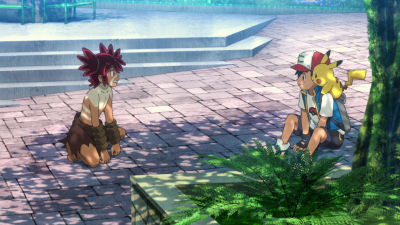
| Japanese
(original) |
Japanese
(translated) |
English
Dub |
| サトシ 「なあ、オレはサトシ」 |
Satoshi: "So, my name's
Satoshi." |
Ash: "So my name's Ash." |
| ピカチュウ 「ピカ ピカチュウ!ピ~カチュウ ピカピ!」 |
Pikachu: "Pika Pikachu!
Pi~kachu Pikapi!" |
Pikachu: "Pika, Pikachu,
Pikachu, Pikapi" |
| ココ 「ピカチュウ ピカピ」 |
Koko: "Pikachu Pikapi" |
Koko: "Pikachu, Pikapi." |
| サトシ 「おっ!ほんとうにしゃべられるんだ!」 |
Satoshi: "Oh! You really can
talk to each other!" |
Ash: "(gasps) You can talk to
each other." |
| ピカチュウ 「ピカピカ!」 |
Pikachu: "Pika Pika!" |
Pikachu: "Pika Pika!" |
| サトシ 「オレは”サトシ”だけど…」 |
Satoshi: "But my name is
actually "Satoshi."" |
Ash: "But my name is Ash. Got
it?" |
| ココ 「サ・ト・シ…」 |
Koko: "Sa-to-shi" |
Koko: "Name is Ash." |
| サトシ 「そう!」 |
Satoshi: "That's it!" |
Ash: "Yeah." |
So the overwhelming
majority of the Dialogue Edits in this movie are going to be ones like
this, where TPCi gives Koko a slightly larger vocabulary in their
version of the film in order to match the number of times the
character's mouth moves. In Koko's final
line above, his mouth moves three times for each syllable of Satoshi's
name; Sa-to-shi. "Ash" is only one syllable, though, so they had to
fill up the other two syllables with "name is."
Pikapi is "Satoshi,"
by the way, something Japanese audiences would definitely have picked
up on but isn't as commonly known
elsewhere.
Music
Edit
The second music edit in the movie takes place during the montage of
Ash and Koko hanging out in town. In the Japanese version the song
played is Show Window by
Okazaki Physical Education while in the English dub it's a brand new
song My New Friends by Ben Dixon.
My New Friends sounds like what
would happen if you made someone listen to Show Window exactly one time and
then said "Alright, now make me a copy of that but make sure you change
it a bit so teacher doesn't notice." Which...like, on the one hand,
it's nice that both versions have similar songs playing in the same
part of the movie, but on the other hand if you're going to do all that
then just dub Show
Window instead...? I don't know why we need this weird bootleg Show Window floating around out
there.
Dialogue
Edit
Koko gets scared of the fireworks:
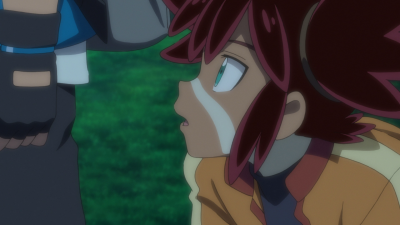
| Japanese
(original) |
Japanese
(translated) |
English
Dub |
| サトシ 「だいじょうぶ!花火だよ 花火!」 |
Satoshi: "It's OK! The're just
fireworks. Fi-re-works." |
Ash: "It's alright. They're
just fireworks." |
| ピカチュウ 「ピカチュウ~!」 |
Pikachu: "Pikachu~!" |
Pikachu: "Pikachu!" |
| ココ 「ハナビ…」 |
Koko: "Fi-re-works..." |
Koko: "Just fireworks." |
Another lip flap issue here; hanabi is three syllables but fireworks is only two and so TPCi had Koko pick up the word "just" in order to match the animation.
"Dada" Zarude talks to the Elder:
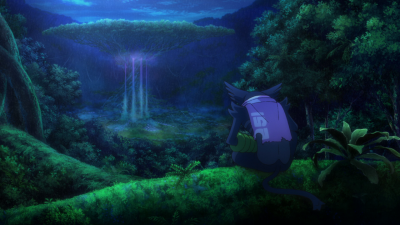
| Japanese
(original) |
Japanese
(translated) |
English
Dub |
| ザルード 「親っていったい何なんですかね?親を知らないオレは親になれなかっ
たです」 |
Zarude: "How could I know
anything about being a parent, you know? I never knew my parents and so
I wasn't able to become one myself." |
Zarude: "How could I know
anything about being a Dada. I never had one, so I never became one." |
The nuances are a bit different in the Japanese version vs. the English version. In Japanese Zarude is saying that the lack of a parental figure of his own meant that he couldn't become a father figure while English Zarude is saying that the lack of a parental figure meant that he didn't. It's a small difference, but a difference nonetheless.
Also, it's worth pointing out that the term oya (親) can be either singular or plural and can refer to either your mother or father. It's the word "parent," basically. Japanese Zarude says that he never knew his oya, which implies that he never knew his mother either, but English Zarude doesn't infer that at all.
In a similar vein, one of the keywords that keeps popping up in the Japanese version of this movie is oyako (親 子), which literally means "parent and child" but could also be interpreted as "father and son." The English dub goes with the much more generic term "family," which works pretty well but has a sliiiiiightly different nuance to it.
RIght as Ash and Koko go to meet Dr. Zed for the first time the Rocket trio continue their search for Cramorant:
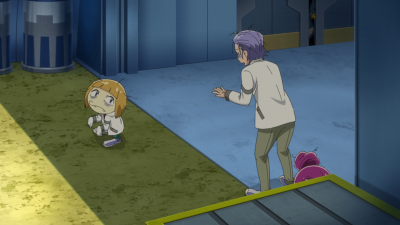
| Japanese
(original) |
Japanese
(translated) |
English
Dub |
| ムサシ 「ほ~らおいしいポケモンフーズよ」 |
Musashi: "Alright now, here's
some yummy Pokémon food~" |
Jessie: "Uh, delicious
Pokémon food." |
| ニャース 「もうこの辺りにはいないニャ」 |
Nyarth: "It seems like it's
not around here anymore Nya." |
Meowth: "There's no one here
to scarf it down but us." |
| コジロウ 「その可能性はある」 |
Kojirou: "That seems likely." |
James: "Pokémon food
gives me gas." |
| ムサシ
「とにかくくまなくさがすのよ!」 |
Musashi: "In any case turn
over every stone until we find it!" |
Jessie: "Just search for the
winged wacko!" |
Most of the Rocket
trio dialogue in this movie gets the TPCi "punch up" treatment where
they'll more or less say the same things as their Japanese
counterparts, only in the most obnoxious and convoluted ways possible.
Thankfully straight-up rewrites like this one, where James talks about
stinking up the room with his farts after eating the Pokémon
world equivalent of dog food, all while doing his best Wacko Warner
impersonation, are a rarity.
Right before we figure out that Dr. Zed isn't such a nice guy after all
Ash tells Koko why he's willing to help him out:
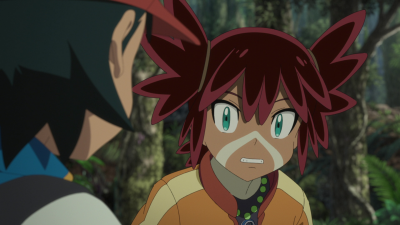
| Japanese
(original) |
Japanese
(translated) |
English
Dub |
| サトシ 「なんでここに来たかって?トモダチだろ?」 |
Satoshi: "Wanna know why we
came here? Well we're friends, aren't we?" |
Ash: "Wanna know why we came
along? That's what friends do." |
| ココ 「トモダチ…」 |
Koko: "Friends." |
Koko: ""What friends do."" |
Lip flap related change Number 3 sees tomodachi, a four syllable word that simply means "friends," get replaced by "what friends do." Which...doesn't really work considering the dub dialogue's still a syllable short?
Later, Dada Zarude tries to get all the other Zarude pumped up for the upcoming battle. During this, the Pokémon recite a variation of the Song of Zarude.
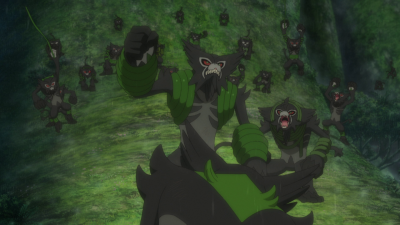
| Japanese
(original) |
Japanese
(translated) |
English
Dub |
| リーダー 「われらはザルード |
Leader: "We are Zarude! |
Alpha: "We are Zarude! |
| だ
れよりも強く |
We're
stronger than anybody, |
We are the strong ones! |
| お
それはしない! |
And
we have nothing to fear |
We have no fear! |
| わ
れら森の血 |
We
are the blood of the forest |
The jungle's lifeblood, |
| 声
をあげろ!」 |
Lift
up your voices!" |
Lift up your voices!" |
| ザルード 「ルザアアッ!」 |
Zarude: "Ru-ZaAa!" |
[Zarude
troop growling] |
| サトシ 「すげえ…」 |
Satoshi: "Wow..." |
Ash: "Amazing." |
| ピカチュウ 「ピ~カ」 |
Pikachu: "Pi~ka" |
Pikachu: "Pika" |
| リーダー 「行くぞ!神木と共に!」 |
Leader: "Let's go! Together
with the Holy Tree!" |
Alpha: "Let's go! For the Heart Tree!" |
In the Japanese version the leader of the Zarude troop is making a callback to The Song of Rules by quoting it basically word-for-word. There are a few tiny differences (the first and last lines are slightly different) but it's like 95% verbatim. In the English version, meanwhile, the alpha Zarude just kind of paraphrases it? If you look at the lyrics to TPCi's Song of Zarude right next to the spoken dialogue of the scene above you'll see what I mean:
| English
Dub (Song of Zarude) |
English
Dub (spoken dialogue) |
| Sing now, Zarude | We
are Zarude! |
| We are the strongest | We
are the strong ones! |
| We have no fear | We
have no fear! |
| We are the voice of the jungle | The
jungle's lifeblood, |
| Lift up your voices | Lift
up your voices! |
| Under the Heart Tree | Let's
go! For the Heart Tree! |
The exact same thing happens a few minutes later in the scene where Dada Zarude starts to spout tentacle-like vines from his back.
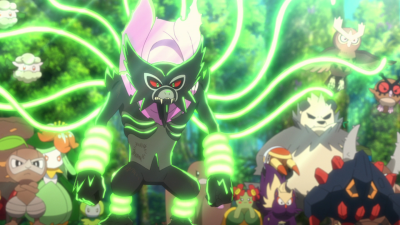
| Japanese
(original) |
Japanese
(translated) |
English
Dub |
| リーダー 「土にしみ入る水」 木は育ち…」 | Leader: "The water soaked up
by the earth makes the trees grow. |
Alpha: "Water raises the
trees." |
| サブリーダー 「陽に照らされ 森となる」 |
Sub-Leader: "They're bathed in sunlight and become the forest." | Sub-Alpha: "The light shines
down and turns trees into jungle." |
| 長老 「そうか。”木”はポケモンたち。”陽”はお前だったのか」 |
Elder: "That's it! The "trees"
are the Pokémon and the "sunlight" is...you!" |
Elder: "Of course, the trees
are the Pokémon, and that means you are the light." |
| ザルード 「聞こえるか 多くの足音が。聞こえるか 多くの声が」 |
Zarude: "Can you hear them?
All those footsteps. Can you hear them? All those voices." |
Zarude: "Do you hear it? The
sound of stomping feet? Do you hear it? The many voices?" |
| ゼッド博士 「なぜ…なぜ立ち上がれる⁉」 |
Dr. Zed: "Why? Why are they
able to stand up!?" |
Dr. Zed: "Again? How can they
stand against me?" |
| 父ちゃんザルード 「われら森の血 鼓動を鳴らせ!神木と共に!」 |
Dada Zarude: "We are the blood
of the forest. So beat the drums! Together with the Holy Tree!" |
Dada Zarude: "The jungle's
lifeblood, lift up your voices! With the Heart Tree!" |
In both these cases, the translation here is perfectly fine. But! The characters are supposed to be quoting the song they were singing at the beginning of the movie and so the dialogue in the English dub should be matching the lyrics to Song of Zarude the same way the dialogue in the Japanese version matches the lyrics to The Song of Rules.
| English
Dub (Song of Zarude) |
English
Dub (spoken) |
| The ground catches the water | Water
raises the trees |
| The water nurtures the trees | |
| The sun shines down the forest | The
light shines down |
| The trees become the jungle | And turns trees into jungle |
| Woo, can you hear it? | Do you hear it? |
| Footsteps upon footsteps | The
sound of stomping feet? |
| Woo, can you hear it? | Do
you hear it? |
| Voices upon voices | The
many voices? |
| We are the voice of the jungle | The
jungle's lifeblood |
| Lift up your voices | Lift
up your voices! |
| Under the Heart Tree | With
the Heart Tree! |
The fourth time the song is referenced -- during the reprise at the very end of the movie -- the lyrics in the English dub are much more faithful to the lyrics of Song of Rules so at least TPCi gets there eventually.
Side Note
The second of two vocal songs to be kept in the English dub is The Hum of the Forest (森のハミング) by the Hino City Tokyo Nanamidori Public Elementary School Choir!
The song doesn't have any actual lyrics and so it was super easy for TPCi to just leave in.
Awkwardly, this is the only song in the whole movie that TPCi doesn't bother to credit at the end of the movie, for some reason.
Dialogue Edit
Ash and Koko say their goodbyes:
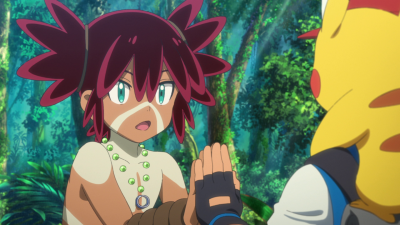
| Japanese
(original) |
Japanese
(translated) |
English
Dub |
| ココ 「サトシ イク?」 |
Koko: "Satoshi, go?" |
Koko: "Ash, go?" |
| サトシ 「ザルードみんなのおかげで思ったより早く木を植えることができたし」 |
Satoshi: "Well, thanks to all
the Zarude the trees are growing a lot faster than I thought they
would." |
Ash: "Well, thanks to all the
Zarude these trees are growing a lot faster than I thought they would." |
| 父ちゃんザルード 「行っちまうってか?」 |
Dada Zarude: "Is he about to
leave?" |
Dada Zarude: "Is he about to
leave?" |
| ココ 「うん。サトシ、ココ、トモダチ」 |
Koko: "Yeah. 'Satoshi, Koko,
friends.'" |
Koko: "Yeah. 'Now Ash, Koko
are
friends.'" |
| サトシ 「あぁ、ずっとな」 |
Satoshi: "Yeah, forever." |
Ash: "Yeah, forever." |
| ピカチュウ 「ピカチュウ」 |
Pikachu: "Pikachu." |
Pikachu: "Pikachu!" |
The fourth lip sync related change in the movie sees Koko picking up new words like "now" and "are" when in the Japanese version Koko is only repeating words that he had learned earlier in the movie.
Music Edit
The main theme song to the movie, Fushigi na Fushigi na Ikimono (ふ しぎなふしぎな生きもの) by Tortoise Matsumoto, gets replaced by an instrumental song called See What I See for the dub.
If you've seen any of the Japanese trailers for the film then you've most likely heard at least snippets from the song. For all intents and purposes Pocket Monsters The Movie "Koko" and Fushigi na Fushigi na Ikimono are one and the same.
In the second episode of Pocket Monsters The Movie "Koko" Supporters' Podcast - "The Movie Secrets We Want to Tell You," director Tetsuo Yajima talks about how he worked with the song's producer, Okazaki Physical Education, since before they even had the film's story all worked out to figure out what the movie's song should say and how it should sound. In other words Fushigi na Fushigi na Ikimono was as much a creation of the film's director as every other part of this film. And yet it got replaced in the English dub.
The dub song is...I'm sorry, but I don't like it. Putting aside the fact that it's replacing the theme song of the film for a moment the music is, based on its own merits, just not very good. I can't imagine ever listening to this thing on its own and then when you put it up against the film's visuals it's obvious that the two just don't go together at all.
TPCi has a lot of talented musicians capable of producing really, really good English language covers of Japanese songs. I wish they had been allowed them to take a crack at this song as well.
Dialogue Edit
Koko tells Ash about his journey
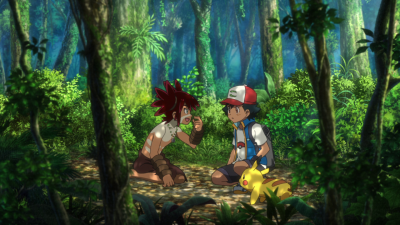
| Japanese
(original) |
Japanese
(translated) |
English
Dub |
| サトシ 「だいじょうぶか?」 |
Satoshi: "Are you alright?" |
Ash: "Are you all right?" |
| ココ 「ココ イク」 |
Koko: "Koko, go." |
Koko: "Koko go too." |
| サトシ 「旅に出るってこと?」 |
Satoshi: "You mean on a
journey?" |
Ash: "You mean on a journey?" |
Apparently Koko picked up the word "too" at some point.
Ash and Koko make their final, for real for real goodbyes:
| Japanese
(original) |
Japanese
(translated) |
English
Dub |
| ココ 「サトシ、ピカチュウ」 |
Koko: "Satoshi, Pikachu." |
Koko: "Bye Ash, Pikachu." |
| サトシ 「ああ!またいつかどっかで!」 |
Satoshi: "Hey, I know we'll
see you again somewhere." |
Ash: "Hey, I know we'll see
you again." |
| ピカチュウ 「ピカチュ!」 |
Pikachu: "Pikachu" |
Pikachu: "Pikachu!" |
These type of changes are unavoidable but they also end up having English dub Koko come out of this movie with a somewhat larger vocabulary of human vocabulary than he did at the end of the Japanese version. Japanese Koko is just learning simple nouns (Satoshi, fireworks, friend) or simple verbs (go) but English Koko is learning all that in addition to all the extra words TPCi put in his mouth. That's not really a big problem in the grand scheme of things, and especially since we'll very likely never see Koko again after this, but it is something that sticks out to me.
Finally, the narrator takes us out:

| Japanese
(original) |
Japanese
(translated) |
English
Dub |
| ナレーション 「この星にはふしぎなふしぎな生き物がいる。人間と共に助け合い
共に生きたまにはケンカをしたり。血のつながりがなくても親子になったりさまざまなきずなをむすびくらしていた。その生き物の数だけの夢があり、その生き
物の数だけの冒険が待っている。その名はポケットモンスター。ちぢめてポケモン。」 |
Narrator: "This world is
inhabited by strange and wonderful creatures. These creatures, together
with humans, help one another, live together, and sometimes even get
into fights. They may not be related by blood but they can still live
together as a parent and child, connected to each other by many
different bonds. There are as many of these creatures as there are
dreams and adventures. And the names of those creatures?
Pocket
Monsters, or "Pokémon" for short!" |
Narrator: "The incredible
unpredictable world of Pokémon. They help each other, they help
humans, living side-by-side. There may be disagreement, but they're
family connected by so many different bonds. And as many people and
Pokémon as there are in this world, there are just as many
dreams and adventures. Yes, filled with hope, filled with wonder, the
amazing world of Pokémon." |
The explicit mention of being "related by blood" is removed from the English version, as is the "Pocket Monsters, or "Pokémon" for short" line that always gets changed in official Western Pokémon products.
Music Edit
The ending theme for the Japanese version is Tadaima to Okaeri (ただいまとおかえり) by Kaela Kimura. It's a fantastic song that just kind of got overlooked while this movie was being promoted in Japan and that's a real shame because it's quite nice.
TPCi replaces this with No Matter What by Cyn. But also, the song is only 2 minutes 14 seconds while the ending animation it's paired up against is more than twice that and so TPCi fills the rest of the time with their own instrumental music.
Now, I had to look up Cyn because I have no idea who the hell she is (insert Principal Skinner "Am I so out of touch!?" meme) and came to find out that she's signed onto a small record label called Unsub Records. So I looked them up and found that Unsub Records was founded by none other than the face of Pokémon 25: The Album herself, Ms. Katy Perry!
So here's my wild, baseless conspiracy theory. Katy Perry agrees to do Pokémon 25: The Album on the condition that 1) TPCi gives her a ton of money to do so, and also 2) that the Pokémon brand agrees to push one of her up-and-coming artists from her record label. TPCi agrees because c'mon, it's Katy Perry, of course we'll do what she says. The result? Cyn gets three Pokémon-related gigs in the year 2021: the song Wonderful for Pokémon 25: The Album and then the opening and ending themes to Pokémon The Movie: Secrets of the Jungle.
These extra negotiations could also maybe explain why fans had to wait an absurdly long ten months between the release of the Japanese version and the English version of this film.
Now I have absolutely no proof of any of this. It could just be that TPCi felt like using this other song, simple as that. But my brain demands an explanation as to why this movie handles everything so, so well except a few of the vocal songs, and this is the best it was able to come up with.
The English version of the ending credits removes the winning entries of the Pocket Monsters The Movie "Koko" Illustration Contest, but that's no surprise.
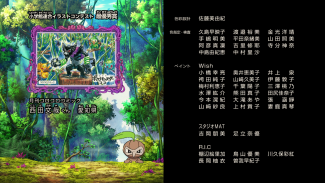 |
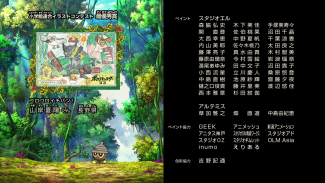 |
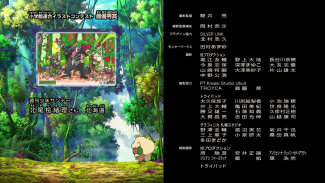 |
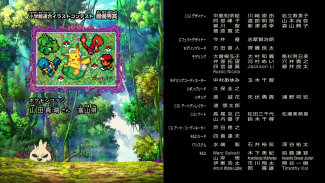 |
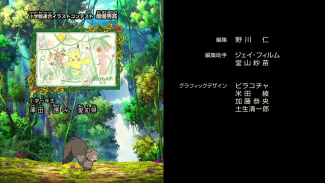 |
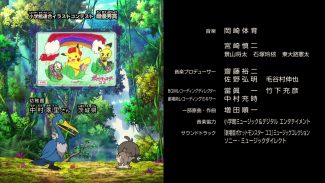 |
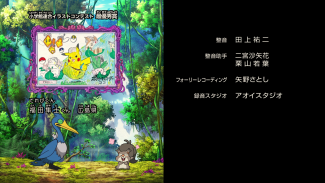 |
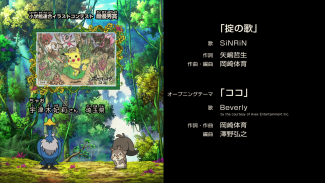 |
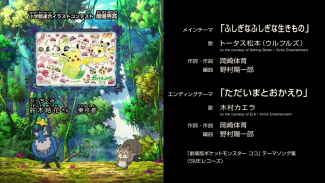 |
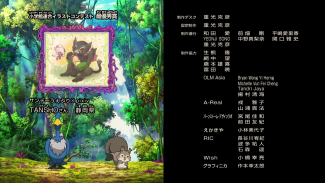 |
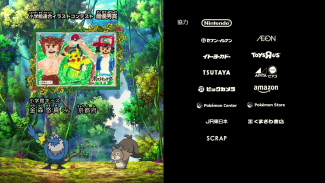 |
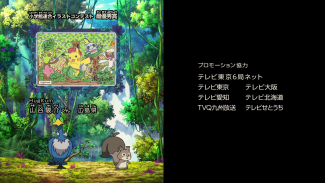 |
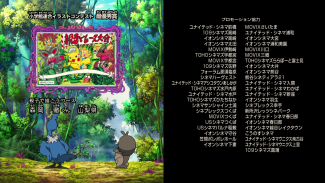 |
|
Final Thoughts
The English dub of this movie gets so, so much right. It's honestly very nearly perfect. The only thing keeping it from getting an A+ from me is the removal of the vocal songs. It's the year 2021, you guys; this type of thing was unacceptable ten years ago, much less now.
As of this writing we still have no idea when the next movie will even come out in Japan, nevermind the rest of the world. Whenever that next movie comes here's hoping TPCi continues to build on all the good work they've been doing the last few movies and finally deliver us the high quality dub they very obviously have the ability to do.
Found an error or omission? Please help me keep this page current and error-free by e-mailing me with a description of the issue.


